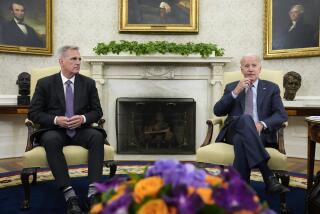OPEC OKs Output Pact; Little Price Impact Seen
- Share via
GENEVA — OPEC ministers ended five days of talks today with a new output agreement, but the pact appeared flawed and did not look as if it would do much to push up prices.
Algeria dissented and called it illegal. Kuwait voiced reservations, as it did with a previous agreement made in June and which it has openly flouted.
The new accord by a majority of the 13 members of the Organization of Petroleum Exporting Countries failed to reallocate quotas and meet demands to sell more oil by Kuwait and the other big quota violator, the United Arab Emirates.
It simply lifted the ceiling on OPEC supply by 1 million barrels daily to 20.5 million--at least a million less than actual volume now--and raised individual countries’ quotas on a pro rata basis.
The oil markets saw little good news in the pact. West Texas Intermediate, the benchmark U.S. crude, fell 28 cents to $19.25 a barrel for the November contract on the New York Mercantile Exchange, although by noon it recovered to $19.38.
Prices for North Sea Brent crude, a world bellwether, dropped 30 cents to 35 cents from the day’s highs to about $17.55 a barrel.
Asked whether Kuwait and the UAE will continue breaking the rules, OPEC Secretary General Subroto of Indonesia told a news conference: “I do not know.”
Some delegates said OPEC had virtually despaired of getting the UAE back in the present quota system. Two of its component emirates, Abu Dhabi and Dubai, compete to produce more oil.
Algeria’s chief delegate said the decision to raise the OPEC ceiling was not unanimous and was therefore illegal.
The 13 ministers had been stymied for five days trying to reallocate quotas in a way that would give Kuwait and the UAE the bigger volumes that they demand.
Finally, with other members unwilling to surrender market share to achieve that, they opted to postpone the attempt to revamp the whole leaky quota system until further talks set for Nov. 25 in Vienna and to make do with a stopgap accord.
More to Read
Sign up for Essential California
The most important California stories and recommendations in your inbox every morning.
You may occasionally receive promotional content from the Los Angeles Times.













